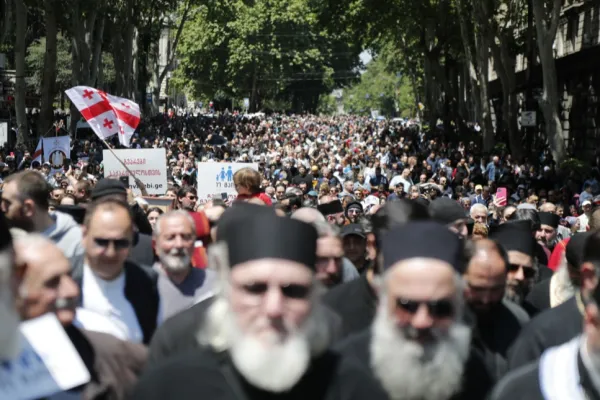After the warm summer, a hot autumn awaits the Czech Republic. Elections to the Chamber of Deputies of the Parliament are held at the beginning of October and they could change the political landscape in the country. The current political hegemon Andrej Babiš and his ANO movement could lose their position, traditional left-wing parties – communists and social democrats – may not make it to the upcoming Chamber of Deputies and there are some new political forces, such as a party led by former anti-mafia policemen, which is growing and promising "justice".
The five opposition parties merged into two big coalitions, which are positioning themselves not only against Babiš, but also against each other.
It already looks like the campaign to come would be hard fought and probably even dirty. We can already observe it now, three months before election. Prime Minister Andrej Babiš, who has the most at stake, has already made it clear which voters he will strive for – those who have recently joined the populist SPD movement, which has been repeatedly pointed out in Interior Ministry reports on extremism, or the rest of communist voters. This corresponds to the topic that the Prime Minister publicly opened up – in recent weeks he has several times warned about the threat of illegal migration, which in fact affects the Czech Republic only very marginally (hundreds of people are detained annually when crossing borders illegally, mostly citizens of post-soviet states).
The Prime Minister began to emphasize the topic of migration on various occasions, often in a surprising context. He talks about “outlanders“ and security threats. "Today and every day in Western Europe, we can see where unmanaged migration can lead. In Germany, polygamy and child marriage are tolerated, in Britain there are parallel Islamic courts, in France migrants cut teachers' heads and attack women for wearing allegedly a very short skirt. (...) I am quite clear. I will never allow anything similar to happen in the Czech Republic," Babiš said in mid-June in a commentary for the daily Právo.
It is obvious that the Prime Minister is very interested in holding on to power – he came into politics as one of the richest entrepreneurs, whose business is dependent on state and European subsidies. Since then, he has been charged with allegedly unauthorized drawing of subsidies, and the European Commission has been investigating his conflict of interest. So it’s clear that he invested a lot in his political career.
Attack on the Pirates
Babiš uses this “threat from the migrants” narrative not only to address his possible voters, but also to attack the Pirate Party, which is now running with the Mayors and Independents movement (STAN); the alliance has been favored by the polls in recent months. Babiš repeatedly tries to portray the Pirates as a party that welcomes migrants and whose “policy can overwrite the cultural environment of our entire country beyond recognition and because of which our children and grandchildren can find themselves in a minority in their own country. And, of course, in danger."
The Pirates then wanted to sue Babiš for the statement that they want to tax big appartements and “then move someone there. Preferably a migrant ".
At some other occasion, when speaking about the spread of Covid, he stated that "we do not want outlanders to come here from all over Europe to drink". He then apologized for "using the wrong word" - the Prime Minister himself comes from Slovakia.
However, it is not only Babiš who uses nationalist sentiments in the campaign. Similar statements can also be heard from the opposition coalition Spolu (Together), which consists of conservative Civic Democrats, Christian Democrats and the pro-European liberal party TOP 09.
A deputy of the Civic Democrats, Jan Skopeček, criticized the fact that the director of the National Gallery, a respected cultural manager named Alicja Knast, is Polish,. "Until today's protest of several artists, I had no idea that the head of the National Gallery is Polish. I like Poles, it is a proud nation that likes us, but I am still convinced that an institution like that, moreover with the adjective 'national' in the name, should be led simply by the Czech," Skopeček wrote on Twitter. He later deleted the tweet, but did not apologize for it. Party chairman Petr Fiala did not condemn this view either, nor did other politicians in the coalition.
Babiš then fights for voters who left his ANO movement to the xenophobic SPD on other fronts. When a Romani man died shortly after the police operation on Saturday, June 19, local Roma and activists compared the case to the death of George Floyd in the United States. At the very beginning of the investigation, government politicians stood up for the police, who announced that, according to a preliminary autopsy report, the man had died of a drug overdose. Babiš called the death "sad", but "a normal decent person will find it difficult to get into a similar situation."
For a long time, Andrej Babiš has been trying to balance between statements that satisfy the xenophobic-minded part of society and the rather liberal attitudes, for example with regard to the LGBTQ minority, among whom he says he has many friends. He also publicly supported the legalization of marriage for same-sex couples (which, however, has not yet been approved in the Czech Republic due to the votes of deputies from his ANO movement who are very loyal to Babiš).
Friendship with Hungary
However, unlike most EU member states, the Czech Republic under Babiš’s leadership recently refused to support the LGBTQ people in Hungary and call on the European Commission to take action against a newly approved Hungarian law banning the distribution of homosexual or gender reassignment among people under 18.
Babiš may have other motivations for this decision than not to annoy the "conservative" part of the population – the Czech Prime Minister has very close relations with the Hungarian Prime Minister Viktor Orbán. In the past, the media pointed out that Babiš personally has important business ties with Hungary in addition to a similar political orientation. His companies do business there and receive multimillion-dollar subsidies. In the spring Foreign Minister Péter Szijjártó announced a decision of his government to grant a subsidy of five million euros to Babiš’ NT food plant. And it is evident that the Czech Prime Minister has very close relations not only with Orban, but also with Szijjártó, as we could see recently when Hungarian Foregign Minister brought 100,000 vaccines to the Czech Republic. At the same time, the Czech government showed that the Hungarian government is not isolated within the EU after its unprecedented steps against the LGBTQ community.
President Miloš Zeman, who is serving in his second and final term in office, is already intensively involved in the current campaign – and he is helping his ally Andrej Babiš. He has already announced that he will vote for his ANO movement (Zeman is a former chairman of the Social Democrats and has recently voted for this party). He also announced in advance that he would appoint the chairman of the winning party, not the coalition, as prime minister after the election. So he made it clear that Babiš will most likely form the next government again, even if the opposition coalition overtook him and had a majority in the Chamber of Deputies.
However, the president himself sharply opened the topic of sexual minorities and stood up for the Hungarian government. "If someone is a member of one or another sexual minority, it is their own business. When he shows that he has this orientation, he rises above others. If I were a little younger, I would organize a huge demonstration of heterosexuals in Prague. And there will be millions of us. And I will bring all the heterosexuals by buses and trains to show how pointless this is. It is pointless to demonstrate, whether as sexual minorities or majorities, because it is their very intimate affair," Zeman said. He added: “"I can understand gays, lesbians and so on. Do you know who I don't understand at all? The transgender people. If you undergo a sex-change operation you are basically committing a crime of self-harm. These transgender people to me are disgusting."
These statements, which provoked criticism in the Czech Republic and attracted the attention of foreign media, set the agenda for a few more days and forced political forces to define themselves.
To cover up an unsuccessful fight with a Covid
Whether setting similar topics will help Babiš or not will become clear in the next weeks and months. In spring, the election polls showed that the Prime Minister and his movement paid hard for a failed fight with the Covid - over 30,000 people died in the Czech Republic, and the government's reactions were often confused and difficult to understand. In April, only 21 percent of voters supported the ANO movement and the two opposition coalitions were on the rise. It is a new situation, as ANO hasn’t faced for many years an unshakable election favorite. Recent polls show ANO brought some voters back. So the situation before elections is open and very shaky.
"Andrej Babiš will not want to mention more than 30,000 people who died in the pandemic in the campaign, but he will want to focus on topics where he feels strong," political scientist Tomáš Lebeda explained for the Seznam Zprávy website.
"We will see whether he manages to be a so-called opinion leader and whether the public will have this topic imposed on him,” added the political scientist.












